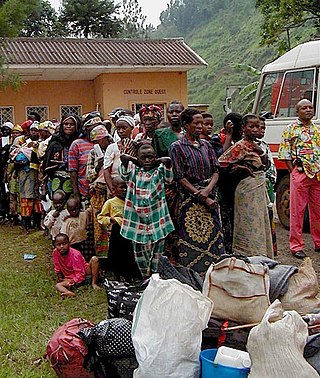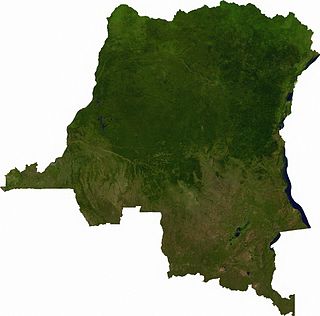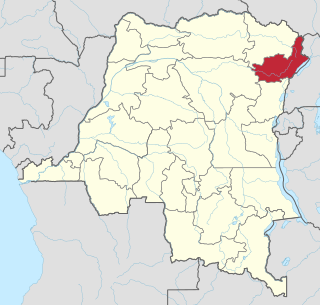Related Research Articles

The Second Congo War, also known as the Great War of Africa or the Great African War, began in the Democratic Republic of the Congo in August 1998, little more than a year after the First Congo War, and involved some of the same issues. Eventually involving belligerents from across the African continent, the war officially ended in July 2003 when the Transitional Government of the Democratic Republic of the Congo took power. Although a peace agreement was signed in 2002, violence has continued in many regions of the country, especially in the east. Hostilities have continued since in the ongoing Lord's Resistance Army insurgency, and the Kivu and Ituri conflicts. Nine African countries and around twenty-five armed groups became involved in the war.
The Sun City Agreement was an award winning agreement that was signed between some of the warring parties in the Second Congo War on 2 April 2003 at the luxury South African casino resort of Sun City, as a result of the Inter-Congolese dialogue (ICD). Delegates hoped that this would be a historic "final act", ending more than four years of war and setting up a government of national unity.

The term Mai-Mai or Mayi-Mayi refers to any kind of community-based militia group active in the Democratic Republic of the Congo (DRC) that is formed to defend local communities and territory against other armed groups. Most were formed to resist the invasion of Rwandan forces and Rwanda-affiliated Congolese rebel groups, but some may have formed to exploit the war to their own advantage by looting, cattle rustling or banditry.
The Movement for the Liberation of the Congo is a political party in Democratic Republic of the Congo. Formerly a rebel group operating in the Democratic Republic of Congo that fought the government throughout the Second Congo War, it subsequently took part in the transitional government and is one of the main opposition parties.
Ernest Wamba dia Wamba was a prominent Congolese academic and political theorist who became a commander of the Kisangani faction of the rebel Rally for Congolese Democracy during the Second Congo War.

The Army for the Liberation of Rwanda was a rebel group largely composed of members of the Interahamwe and Armed Forces of Rwanda. Operating mostly in the eastern regions of the Democratic Republic of the Congo along the border with Rwanda, it carried out attacks throughout the Second Congo War against forces aligned with Rwanda and Uganda. In 2000, the ALiR agreed to merge with the Hutu resistance movement based in Kinshasa into the new Democratic Forces for the Liberation of Rwanda (FDLR). ALiR was largely supplanted by the FDLR by 2001.

Azarias Ruberwa Manywa is a Congolese politician, lawyer, and public figure. During the Second Congo War he was Secretary-General of the Rassemblement Congolais pour la Démocratie (RCD-G) rebel group. Following the war he was one of the vice-presidents in the transitional government of the Democratic Republic of the Congo between 2003-2006. He has also been the leader and president of RCD-G's political party since 2003. He is a member of the Banyamulenge community of South Kivu who belong to the Tutsi ethnic group.

Eugène Serufuli Ngayabaseka is a Congolese politician, the ex 2nd Vice President of the Congolese Rally for Democracy-Goma and was the governor of Nord-Kivu province from July 31, 2000 until 2007, when was succeeded by the RCD-K-ML candidate, Paluku Kahongya Julien.

Articles related to the Democratic Republic of the Congo include:
The Forces for Renewal, generally still known by its original name RCD-Kisangani-Movement for Liberation (RCD/K-ML), is a political party in the Democratic Republic of Congo. The party originated as a breakaway faction of the rebel Rally for Congolese Democracy (RCD).
Congolese history in the 2000s has primarily revolved around the Second Congo War (1998–2003) and the empowerment of a transitional government.
The Lusaka Ceasefire Agreement attempted to end the Second Congo War through a ceasefire, release of prisoners of war, and the deployment of an international peacekeeping force under the auspices of the United Nations. The heads of state of Angola, the Democratic Republic of the Congo, Namibia, Rwanda, Uganda, Zambia, and Zimbabwe signed the agreement in Lusaka, Zambia on July 10, 1999.

United Nations Security Council resolution 1258, adopted unanimously on 6 August 1999, after reaffirming Resolution 1234 (1999) on situation in the Democratic Republic of the Congo, the Council authorised the deployment of military liaison personnel to the capitals of the signatories of the Lusaka Ceasefire Agreement.

United Nations Security Council resolution 1399 was adopted unanimously on 19 March 2002. After recalling all previous resolutions on the situation in the Democratic Republic of the Congo, the Council condemned the capture of the town of Moliro and other activities by the rebel Rally for Congolese Democracy (RCD).

United Nations Security Council resolution 1468, adopted unanimously on 20 March 2003, after recalling previous resolutions on the situation in the Democratic Republic of the Congo, the Council welcomed an agreement on the establishment of a transitional government and requested an increased presence of the United Nations Mission in the Democratic Republic of Congo (MONUC) in the Ituri region in the east of the country amid escalating violence.
The Congolese Rally for Democracy, also known as the Rally for Congolese Democracy, is a political party and a former rebel group that operated in the eastern region of the Democratic Republic of the Congo (DRC). It was supported by the government of Rwanda, and was a major armed faction in the Second Congo War (1998-2003). It became a social liberal political party in 2003.
Kanyabayonga is one of the groupements (groupings) within the Bwito Chiefdom in the Rutshuru Territory of North Kivu Province in the eastern Democratic Republic of the Congo (DRC). The region has suffered from continued violence between the army and rival militias since 1993.
The Congolese Rally for Democracy–Goma was a faction of the Congolese Rally for Democracy, a rebel movement based in Goma, Democratic Republic of the Congo (DRC) during the Second Congo War (1998–2003). After the war, some members of the group continued sporadic fighting in North Kivu. The movement also entered mainstream politics, participating in democratic elections with little success.
Émile Ilunga Kalambo is a politician and former leader of the Rally for Congolese Democracy–Goma (RDC-Goma) rebel movement.
The Truth and Reconciliation Commission was a truth commission which ran from July 2003 - February 2007 to investigate and promote national unity as a response to the atrocities committed in the war in the Democratic Republic of Congo between the Congolese army, Congolese rebels, and foreign insurgents.
References
- Kulkarni, D.V. (2017). Sustainable Peace in the Twenty?First Century: Bridging the Gap from Theory to Practice. Peace Education. Information Age Publishing, Incorporated. ISBN 978-1-68123-751-0 . Retrieved 2022-07-16.